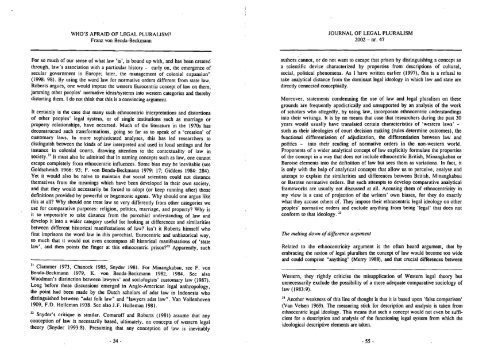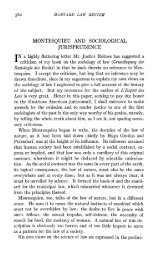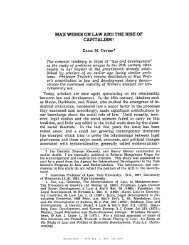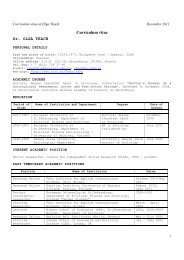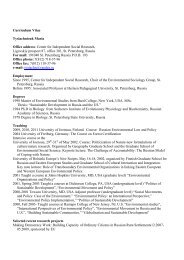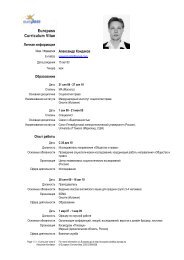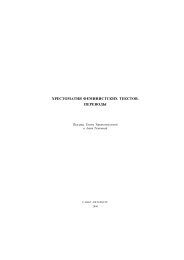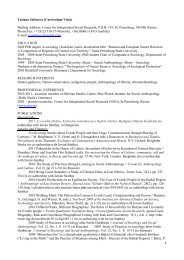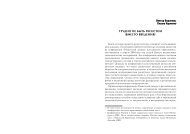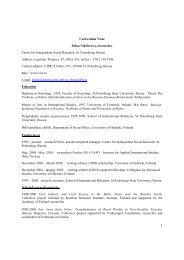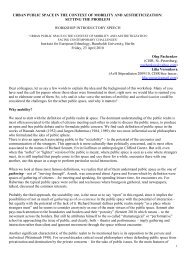who's afraid of legal pluralism?
who's afraid of legal pluralism?
who's afraid of legal pluralism?
You also want an ePaper? Increase the reach of your titles
YUMPU automatically turns print PDFs into web optimized ePapers that Google loves.
WHO'S AFRAID OF LEGAL PLURALlSM?Franz von Benda-BeckmannJOURNAL OF LEGAL PLURALlSM2002 - nr. 47For so much <strong>of</strong> our sense <strong>of</strong> what law 'is', is bound up with, and has been createdthrough, law's association with a particular history - early on, the emergence <strong>of</strong>secular governmenl in Europe; laler, lhe managemenl <strong>of</strong> colonial e"pansion"(1998: 98). By using the word law for normative orders differenl from state law,Roberts argues, one would impose the weSlern Eurocenlric concept <strong>of</strong> law on lhem,jarnrning other peoples' normalive ideas/systems into westem categories and therebydislorting lhem. I do nol lhink thal this is a convincing argumenl.lt certainly is the case tha.t many such ethnocentric imerpretations and distortions<strong>of</strong> other peoples' <strong>legal</strong> syslem, 01' <strong>of</strong> single inslitutions sueh as marriage 01'properly relationships, have occurred. Much <strong>of</strong> the lilerature in the ]970s hasdeconslructed such transformalions, going so far as to speak <strong>of</strong> a 'creation' <strong>of</strong>cuslomary Jaws. In more sophisticaled analyses, lhis has led researchers lOdislinguish between the kinds <strong>of</strong> law interpreted and used in local settings and forinslanee in colonial courts, drawing attention to the conte"tualily <strong>of</strong> law insociety.21 lt musl also be admitted that in naming concepts such as law, one cannotescape completely from ethnocentric influences. Sorne bias may be inevilable (seeGoldschmidl 1966: 93; F. von Benda-Beckmann 1979: 17; Giddens 1984: 284).Vet it would also be naive lo maintain lhat social scientists could not dislaneethemselves from lhe meanings which have been developed in their own society,and lhat lhey would necessarily be forced to adopt (01' keep running after) thosedefinilions provided by powerful 01' hegemonic agems. Why should one argue likethis at all? Why should one treat law so very differently from other categories weuse for eomparative purposes: religion, politics, marriage, and property? Why isit so impossible 10 lake distance from lhe parochial underslanding <strong>of</strong> law anddevelop it ¡mo a wider category usefui for looking at differences and similaritiesbetween dífferem historieal manifestations <strong>of</strong> law? Isn't it Roberts himself wh<strong>of</strong>irst imprisons the word law in lhis parochial, Eurocentric and unhistorical way,so much that it would not even encompass all historical manifestations <strong>of</strong> 'statelaw'. and then poinls lhe finger at this ethnocentrie prison?22 Apparently, such21 Clammer 1973, Chanock 1985, Snyder 1981. For Minangkabau, see F. vonBenda-Beckmann 1979, K. von Benda-Beckmann 1982, 1984. See alsoWoodman's distinction belween lawyers' and sociologislS' customary ]aw (1987).Long before lhese discussions emerged in Anglo-American <strong>legal</strong> anthropology,the point had been made by the Dutch scholars <strong>of</strong> adat law in Indonesia whodistinguished between "adat folk law" and "Iawyers adat law". Van Vollenhoven1909, F.O. Holleman 1938. See also J.F. Holleman 1981.22 Snyder's critique is similar. Comar<strong>of</strong>f and Roberts (1981) assume that anyconceplion <strong>of</strong> Jaw is necessarily based, ultimately, on concepts <strong>of</strong> western <strong>legal</strong>theory (Snyder 1993:8). Presuming lhal any conception <strong>of</strong> law is inevitablyauthors cannot, or do not wam to escape that prison by distinguishing a concept asa sciemific device characterized by properties from descriptions <strong>of</strong> cultural,social, polilical phenomena. As 1 have written earlier (1997), Chis is a refusal totake analytical distance from the dominant <strong>legal</strong> ideology in which law and stale aredirectly connecled concepnially.Moreover, slatemenls condemning the use <strong>of</strong> law and <strong>legal</strong> <strong>pluralism</strong> on thesegrounds are frequently apodietieally and unsupported by an analysis <strong>of</strong> the work<strong>of</strong> scholars who allegedly, by using law, incorporate ethnoeentric underslandingsinto lheir wrilings. It is by no means that case that researehers during the pasl 30years would usually have lranslaled certain characleristics <strong>of</strong> 'western laws' such as their ideologies <strong>of</strong> court decision making (rules determine outcomes), thefunctional differentiation <strong>of</strong> adjudication, the differentiation belween Jaw andpolitics - imo their reading <strong>of</strong> normative orders in the non-western world.Proponents <strong>of</strong> a wider analyiical concept <strong>of</strong> law e"plieitly formulate the properties<strong>of</strong> the coneept in a way that does not inelude ethnoeentric British, Minangkabau 01'Barotse elemems ¡mo the definilion <strong>of</strong> law but sees them as varialions. In fact, itis only with the help <strong>of</strong> analytical concepts that alIow us to pereeive, analyse andattempt to e"plain the similarities and differences between British, Minangkabau01' Barotse normative orders. But sueh attempts to develop comparalive analyticalframeworks are usually not discussed at all. Aecusing them <strong>of</strong> ethnocenlricity inmy view is a case <strong>of</strong> projeclion <strong>of</strong> lhe writers' own biases, for they do exactlywhal they aceuse olhers <strong>of</strong>. They impose their ethnocentric <strong>legal</strong> ideology on otherpeoples' normative orders and e"elude anything from being '<strong>legal</strong>' that does notconform to lhat ideology. 23The meiting down 01 difference argumentRelated to lhe elhnocentricilY argument is the <strong>of</strong>ten heard argument, thal byembracing the nolion <strong>of</strong> <strong>legal</strong> <strong>pluralism</strong> !he eoncept <strong>of</strong> law would become too wideand could comprise "anything" (Merey 1988), and that crucial differences betweenWestern, they rightly erilicise the misapplication <strong>of</strong> Western <strong>legal</strong> theory butunnecessarily é",c1ude the possibílity <strong>of</strong> a more adequate comparative sociology <strong>of</strong>law (1983:9).23 Another weakness <strong>of</strong> lhis Hne <strong>of</strong> thought is that it is based upan 'false comparison'(Van Velsen 1969). The measuring stick for description and analysis is taken fromethnoeenlric <strong>legal</strong> ideology. This means that such a concept would not even be sufficientfor a description and analysis <strong>of</strong> the functioning <strong>legal</strong> system from which lheideological descripiive elements are taken.- 54 - - 55


